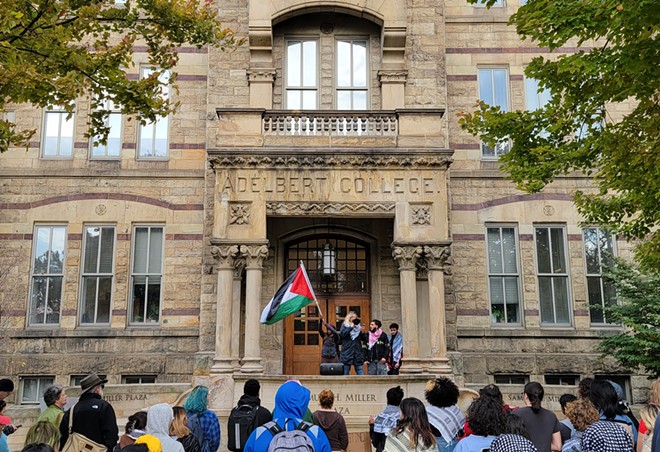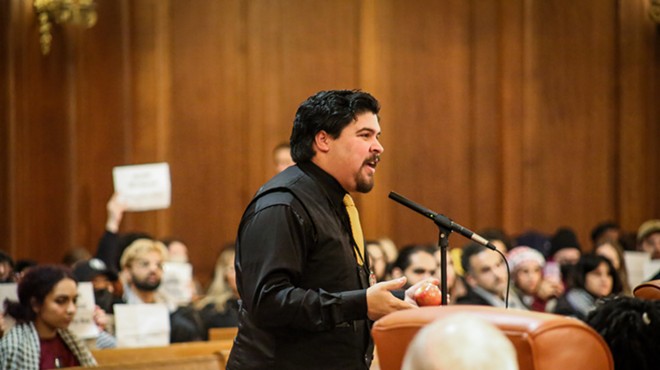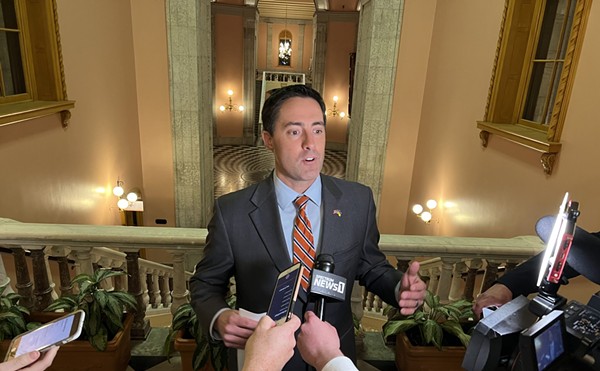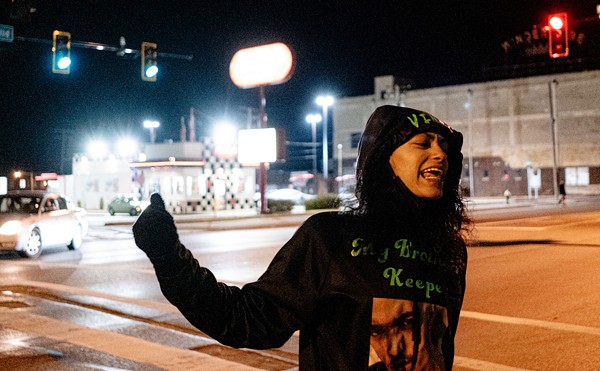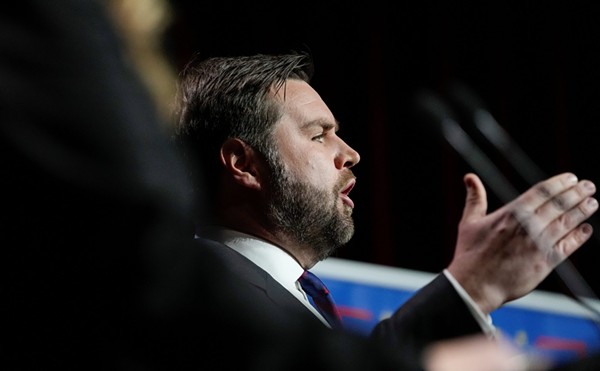Imposing an "interim loss of recognition" as a student club, according to a letter dated February 26, the university's Office of Student Conduct had accused some 15 unnamed SJP members of "glueing fliers" on its outdoor Spirit Wall, which the office said was a violation of their posting policy.
The OSC, led by director George O'Connell, took a stiff-arming route: They demanded, in that same letter, SPJ to cough up the names of the 15 accused of glueing the fliers, along with delivering a complete roster of the club. If not, goodbye to club recognition.
"Failure to adhere to this notice, or any form of retaliation, will be considered an additional code of conduct violation," O'Connell wrote, "and may result in further conduct charges and sanctions."
Come Monday, following months of unproductive talks with Case Western President Eric Kaler, or other representatives of his administration, SPJ took the flier ban as a veiled attempt to stymie its tactics to highlight wartime atrocities.
"Now, it is permanent," SPJ wrote on its Instagram page. "The relationship between CWRU administration and its students is forever tainted."
As it has at home. Since November, pro-Palestine coalitions have marched up and down Euclid Avenue, or have cut City Council's Monday meetings short with their chanting. Many have advocated for a ceasefire resolution or similar public commitment that tells them their city, or their university, acknowledges the full extent of the Gaza conflict.
And that tension is visceral at Case Western, where SJP and its supporters have been at loggerheads with Kaler since the president's signing of a "We Stand With Israel" pledge in the middle of October.
SJP responded with similar demands as others had placed on Cleveland City Council: Kaler must, they said, sign Resolution 31-15 (to cut any ties with Israel), along with demonstrating "the administration's commitment to the safety of their Palestinian, Muslim, Arab and ALL students on campus." Then, hundreds staged a walkout against Kaler. Anti-SJP fliers went up around campus. SJP canceled a networking dinner after a pro-Israel extremist was seen harassing students.
"To be clear, we have no tolerance for antisemitism, Islamophobia, racism or hatred of any form," Kaler responded, in a letter November 10, one "endorsed by 40 professors."
"While we uphold freedom of expression, we do not tolerate words and phrases that are antisemitic, Islamophobic or racist," he wrote. "Our speech and actions should never make anyone feel unsafe, and this includes using threatening, intimidating and/or harassing tactics, images or symbols. In that regard, please be mindful as you curate information that informs your views and how you express yourself."
The same day, the Office of Student Conduct launched an investigation into SJP, accusing it of violating a section of student code—namely, "verbal abuse," of "threatening" and "intimidating" behavior.
As for the accusations of glueing fliers to Case's Spirit Wall, which the school said began on February 13, the details are somewhat vague. For one, Case's posting policy for its Spirit Wall doesn't mention "glue," or penalties for damaging adhesive. (A $50 fine for others.) And, though SJP received warnings from the OSC, they claimed they were unable to "provide any defense to the allegation."
"This allegation by CWRU demonstrates that students who support Palestinian voices are guilty until proven innocent," SJP's statement reads.
After contacting Case Western for a followup, a spokesperson sent Scene the following statement, which recapped the intention of SJP's current ban.
"As noted in the letter, this Interim Loss of Recognition is due to the organization’s ongoing failure to follow the university’s posting policy and student code of conduct, as well as failure to respond to requests from the Office of Student Conduct and Community Standards," the statement read, recalling steps to have SJP "considered for reinstatement of organizational recognition."
SJP did not respond to requests for comment.
Subscribe to Cleveland Scene newsletters.
Follow us: Apple News | Google News | NewsBreak | Reddit | Instagram | Facebook | Twitter | Or sign up for our RSS Feed

